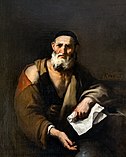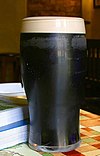User:Rfl/FeaturedArticle
Featured articles[edit]
Featured articles · candidates · collaboration of the week
May 11[edit]
Leucippus was a Greek philosopher of the 5th century BCE. He is credited with founding atomism, with his student Democritus. Leucippus divided the world into two entities: atoms, indivisible particles that make up all things, and the void, the nothingness between the atoms. Leucippus's ideas were influential in ancient and Renaissance philosophy. They were a precursor to modern atomic theory, but the two are only superficially similar. Leucippus's atoms come in infinitely many forms, all in constant motion, creating a deterministic world created by the collisions of atoms. The soul is viewed as an arrangement of spherical atoms, cycled through the body by respiration and creating thought and sensory input. Little is known of his life, with a few scholars doubting that he existed, attributing his ideas purely to Democritus. Two works are attributed to Leucippus, The Great World System and On Mind, but all of his writing has been lost except for one sentence. (Full article...)
April 11[edit]
Garry Kasparov is a chess grandmaster and one of the strongest human chess players in the world. He is the highest rated on the FIDE January 2005 list at 2804, and he is the highest rated player ever with his 2851 ELO in 1999. He was classical world chess champion from 1985 until 2000. Over the last decade, he has played a series of matches against chess machines, including Deep Blue and X3D Fritz. Kasparov, who announced his retirement from serious chess on March 10 2005, has been credited with the invention of Advanced Chess, a new form of chess in which a human and a computer join their forces. (more...)
Recently featured: Ryanair – Government of Maryland – Blackadder
March 11[edit]
The League of Nations was an international organization founded after the First World War at the Paris Peace Conference in 1919. The League's goals included disarmament; preventing war through collective security; settling disputes between countries through negotiation and diplomacy; and improving global welfare. The League was a government of governments, with the role of settling disputes between individual nations in an open and legalist forum. The League lacked an armed force of its own and so depended on the Great Powers to enforce its resolutions, which they were often very reluctant to do. The League ultimately proved incapable of preventing aggression by the fascist powers in 1930s. The onset of the Second World War made it clear that the League had failed in its primary purpose—to avoid any future world war. The United Nations effectively replaced it after World War II and inherited a number of agencies and organisations founded by the League. (more...)
Recently featured: Comet Hale-Bopp – San Jose – Chemical warfare
February 11[edit]
The economy of the Republic of Ireland is modern, relatively small, and trade-dependent with growth averaging a robust 10% in 1995–2000. Agriculture, once the most important sector, is now dwarfed by industry. Although exports remain the primary engine for Ireland's robust growth, the economy is also benefiting from a rise in consumer spending and recovery in both construction and business investment. Inflation stands at 2.3% as of 2005, but this is only a recent recovery from rates of between 4% and 5%. House price inflation has been a particular economic concern (average house price was €220,000 in 2004) as well as service charges (utilities, insurance, healthcare, legal representation, etc.). Dublin, the nation's capital, was ranked 22nd in a worldwide cost of living survey in 2004. (more...)
Recently featured: Coconut crab – Jonathan Wild – Battle of Inchon
January 11[edit]
The Polish-Lithuanian Commonwealth was a federal monarchy-republic formed by the Kingdom of Poland and the Grand Duchy of Lithuania in 1569, lasting until 1795. The Commonwealth was an extension of the Polish-Lithuanian Union, a personal union between those two states that had existed from 1386. The Commonwealth was one of the largest and most populous states in Europe and for over two centuries successfully withstood aggressions from the Teutonic Order, the Mongols, the Russians, the Ottomans, and Sweden. The Commonwealth was notable for its political system, which was a precursor to modern democracy and federation; for its remarkable religious tolerance; and for the second-oldest written national constitution in the world. Its economy was dominated by agriculture. While the Commonwealth's first century was a Golden Age for both Poland and Lithuania, the second century was marked by military defeats, a return to serfdom for the peasants, and growing anarchy in political life. (more...)
Recently featured: President of Ireland – Pet skunk – Chuck Palahniuk
December 11[edit]
The National Flag of the Republic of China is a well-known symbol of the Republic of China (ROC), which since 1949 has been based on Taiwan. It is commonly referred to in Chinese as Blue Sky, White Sun, and a Wholly Red Earth to reflect its physical appearance. This design was first used in China by the Nationalist Party of China in 1917 and made the official flag of the ROC in 1928. The current use of the flag is controversial due to the contentious political status of Taiwan. Its use is opposed by the People's Republic of China (PRC) because it suggests the continued existence of the ROC, which the PRC regards as defunct and to have been succeeded by the PRC in the Communist revolution. Within Taiwan, the flag is embraced as a symbol by Chinese reunification supporters as a historical link with mainland China and shunned by Taiwan independence supporters for mainly the same reasons. Though it is commonly known in English as the flag of Taiwan (as the ROC is often referred to as "Taiwan"), this term is not commonly used in Chinese as some of the current symbolism and controversy can only be understood if one realizes that it is not officially the "flag of Taiwan" but of a Republic that only acquired Taiwan in 1945 and moved its government there in 1949. (more...)
Recently featured: Saturn V – Paragraph 175 – Bishōjo game
November 11[edit]
Sarajevo is the capital and largest city of Bosnia and Herzegovina. It is considered one of the most important cities in the Balkans and has had a long and rich history ever since it was founded by the Ottomans in 1461. It was the site of the assassination of Archduke Franz Ferdinand which sparked World War I; more recently Sarajevo has hosted the 1984 Winter Olympics and experienced the longest siege in the history of modern warfare. Sarajevo is part of Canton Sarajevo, one of the ten Cantons of Federation of Bosnia and Herzegovina. It is located close to the geometric center of the triangularly-shaped Bosnia and Herzegovina, and covers some 142 km² (88.2 square miles) of land. Sarajevo has a continental climate, lying between the climate zones of central Europe to the north and the Mediterranean to the south. The city has warm summers, with temperatures of 35°C (95°F) not being uncommon; Sarajevo also has cold winters with much snow due to the city's high altitude. (more...)
Recently featured: Japanese toilet – Shrine of Remembrance – Parliament of Canada
October 11[edit]
The Hebrew calendar is the annual calendar used in Judaism. It is a lunisolar calendar, based upon both lunar months and a solar cycle (which defines its years). This is in contrast to the Gregorian calendar, which is based solely upon a solar cycle, or the Islamic calendar, which is purely lunar. Jews use this calendar to determine when the new Hebrew months start; this calendar determines the Jewish holidays, which Torah portions to read, and which set of Psalms should be read each day. Jews have been using a lunisolar calendar since Biblical times, but originally referred to the months by number rather than name. The epoch of the modern Hebrew calendar is Monday, October 7, 3761 BCE, corresponding to 1 Tishri AM 1 (AM meaning Anno Mundi, "in the year of the world"). This date is about one year before the traditional Jewish date of Creation on 25 Elul AM 1. (more...)
Recently featured: First Amendment to the US Constitution – Io – James Joyce
September 11[edit]
Nineteen Eighty-Four was a British television adaptation of the novel of the same name by George Orwell, originally broadcast on BBC Television in the winter of 1954. Orwell's novel was adapted for television by Nigel Kneale, one of the most successful television scriptwriters of the era. Although all went off well technically and artistically, the production proved to be hugely controversial. There were complaints both about the "horrific" content (particularly the infamous Room 101 scene where Winston Smith is threatened with torture by rats) and the "subversive" nature of the play. Most were worried by the depiction of a totalitarian government controlling the population's thoughts. (more...)
Recently featured: Mains power plug – Milgram experiment – Alliterative verse
September 6[edit]
The Warsaw Uprising was an armed struggle during the Second World War by the Polish Home Army (Armia Krajowa) to liberate Warsaw from German occupation and Nazi rule. It started on August 1, 1944 as a part of a nationwide uprising, Operation Tempest. The Polish troops resisted the German-led forces until October 2. An estimated 85% of the city was destroyed during the urban guerrilla war and after the end of hostilities. The Uprising started at a crucial point in the war as the Soviet army was approaching Warsaw. Although the Soviet army was within a few hundred metres of the city from September 16 onward, the link between the uprising and the advancing army was never made. This failure and the reasons behind it have been a matter of controversy ever since. (more...)
Recently featured: Anno Domini – PaX – Behistun Inscription
August 11[edit]
MKULTRA was the code name for a CIA mind control research program lasting from the 1950s through the 1970s. Starting from 1964, the project was renamed to MKSEARCH. The project's goal was to produce a perfect truth drug for use in interrogating suspected Soviet spies during the Cold War, and generally to explore any other possibilities of mind control. Experiments were often conducted without the subjects' knowledge or consent. The project was headed by Dr. Sidney Gottlieb. (more...)
Recently featured: Middle-earth – Great Mosque of Djenné – War elephant
July 11[edit]
The saxophone is a musical instrument of the woodwind family, usually made of brass and with a distinctive loop bringing the bell upwards. It was invented by Adolphe Sax in the mid-1840s. The saxophone is most commonly associated with popular music, big band music, and jazz, but it was originally intended as both an orchestral and military band instrument. The inspiration for the instrument is unknown, but there is good evidence that fitting a clarinet mouthpiece to an ophicleide is the most likely origin. The majority of saxophones produced today are made from brass. However, several manufacturers offer additional coatings that can be applied over the brass, such as silver, gold, nickel and lacquer. (more...)
Recently featured: Weather lore – Separation of powers under the United States Constitution – Mark Antony
June 11[edit]
Bullfighting involves professional performers (matadores) taunting bulls at close range and often slowly killing them. It is a controversial but popular spectacle staged principally in Spain (where there are over 400 arenas) but also in Portugal, some countries in Latin America, California and in the south of France. Bullfighting goes back to Crete where youths jumped over bulls and ancient Rome, when many people-versus-animal events were held as a warm-up for gladiatorial sports. Many supporters of bullfighting regard it as a deeply ingrained integral part of their national cultures. Animal rights campaigners object strongly to bullfighting because they think that the bull suffers a slow, painful death. Bullfighting is banned in many countries. (more...)
Recently featured: The Foundation Series – Tea – World War I
May 11[edit]
Taiwanese is the home language for about 60 percent of the population of Taiwan. Native speakers of Taiwanese are known as Hō-ló. The language, a tonal one with extremely extensive tone sandhi rules, is similar to the speech of the southern part of Fujian in China. There are special literary and art forms in Taiwanese such as Chhit-jī-á, a poetic meter where each verse has 7 syllables; and koa-a-hì, Taiwanese opera. (more...)
Recently featured: Chess – European Union – Provinces of Thailand
April 11[edit]
The origins of the American Civil War lay in the complex problems of slavery, expansion, sectionalism, parties, and politics of the antebellum era. As territorial expansion forced the United States to confront the question of whether new areas of settlement were to be slave or free, as the power of the slaveholders in national politics waned, and as the North and the South developed starkly divergent economies and societies, the divisive issues of sectionalism catapulted the nation into the Civil War. (more...)
Recently featured: Heavy metal – Dreyfus Affair – Frankfurt School
March 11[edit]
LEGO is a Danish toy company best known for its line of interconnecting plastic bricks. The company's name was coined by Ole Kirk Christiansen in 1934, from the Danish phrase "leg godt", meaning "play well." The word "LEGO" also means "I put together" or "I assemble" in Latin. Lego bricks are designed to be so straightforward that even children require little or no instruction in how to use them. On June 7, 1968, the LEGOLAND Park in Billund was opened. This theme park featured elaborate models of miniature towns, built entirely from LEGO bricks. A location in the USA has since opened. (more...)
Recently featured: Leonardo da Vinci - bathing machine - Sperm Whale














